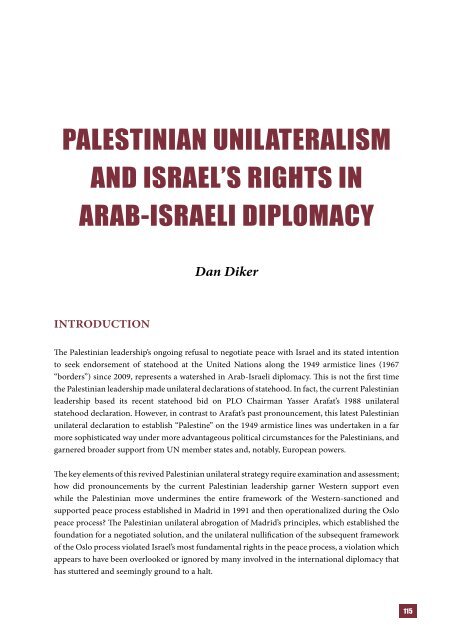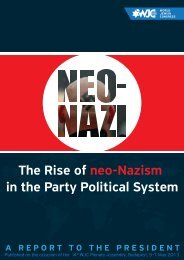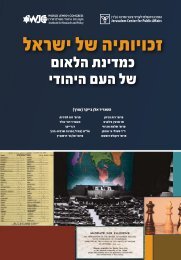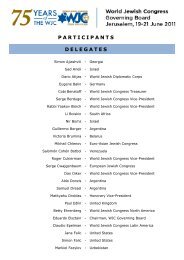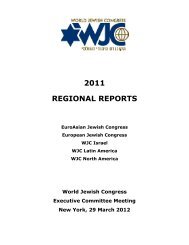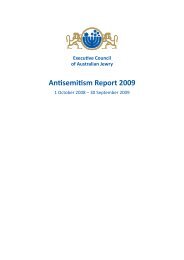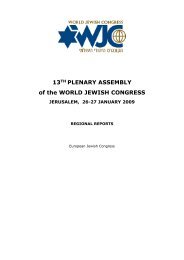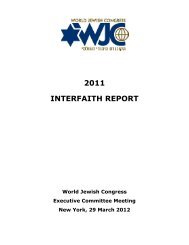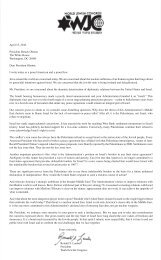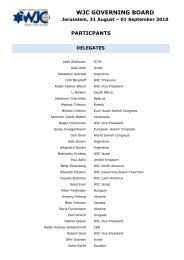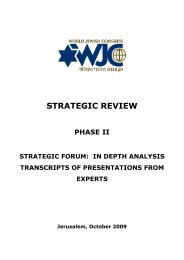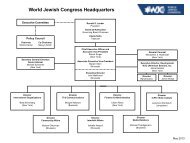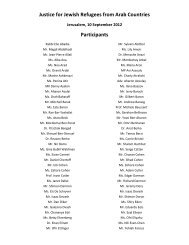Palestinian Unilateralism and Israel's Rights in Arab-Israeli Diplomacy
Palestinian Unilateralism and Israel's Rights in Arab-Israeli Diplomacy
Palestinian Unilateralism and Israel's Rights in Arab-Israeli Diplomacy
Create successful ePaper yourself
Turn your PDF publications into a flip-book with our unique Google optimized e-Paper software.
<strong>Palest<strong>in</strong>ian</strong> <strong>Unilateralism</strong><br />
<strong>and</strong> Israel’s <strong>Rights</strong> <strong>in</strong><br />
<strong>Arab</strong>-<strong>Israeli</strong> <strong>Diplomacy</strong><br />
Dan Diker<br />
Introduction<br />
The <strong>Palest<strong>in</strong>ian</strong> leadership’s ongo<strong>in</strong>g refusal to negotiate peace with Israel <strong>and</strong> its stated <strong>in</strong>tention<br />
to seek endorsement of statehood at the United Nations along the 1949 armistice l<strong>in</strong>es (1967<br />
“borders”) s<strong>in</strong>ce 2009, represents a watershed <strong>in</strong> <strong>Arab</strong>-<strong>Israeli</strong> diplomacy. This is not the first time<br />
the <strong>Palest<strong>in</strong>ian</strong> leadership made unilateral declarations of statehood. In fact, the current <strong>Palest<strong>in</strong>ian</strong><br />
leadership based its recent statehood bid on PLO Chairman Yasser Arafat’s 1988 unilateral<br />
statehood declaration. However, <strong>in</strong> contrast to Arafat’s past pronouncement, this latest <strong>Palest<strong>in</strong>ian</strong><br />
unilateral declaration to establish “Palest<strong>in</strong>e” on the 1949 armistice l<strong>in</strong>es was undertaken <strong>in</strong> a far<br />
more sophisticated way under more advantageous political circumstances for the <strong>Palest<strong>in</strong>ian</strong>s, <strong>and</strong><br />
garnered broader support from UN member states <strong>and</strong>, notably, European powers.<br />
The key elements of this revived <strong>Palest<strong>in</strong>ian</strong> unilateral strategy require exam<strong>in</strong>ation <strong>and</strong> assessment;<br />
how did pronouncements by the current <strong>Palest<strong>in</strong>ian</strong> leadership garner Western support even<br />
while the <strong>Palest<strong>in</strong>ian</strong> move underm<strong>in</strong>es the entire framework of the Western-sanctioned <strong>and</strong><br />
supported peace process established <strong>in</strong> Madrid <strong>in</strong> 1991 <strong>and</strong> then operationalized dur<strong>in</strong>g the Oslo<br />
peace process? The <strong>Palest<strong>in</strong>ian</strong> unilateral abrogation of Madrid’s pr<strong>in</strong>ciples, which established the<br />
foundation for a negotiated solution, <strong>and</strong> the unilateral nullification of the subsequent framework<br />
of the Oslo process violated Israel’s most fundamental rights <strong>in</strong> the peace process, a violation which<br />
appears to have been overlooked or ignored by many <strong>in</strong>volved <strong>in</strong> the <strong>in</strong>ternational diplomacy that<br />
has stuttered <strong>and</strong> seem<strong>in</strong>gly ground to a halt.<br />
115
The <strong>Palest<strong>in</strong>ian</strong> leadership’s tactical consideration of whether it ends up seek<strong>in</strong>g formal UN<br />
endorsement <strong>in</strong> September 2011, is a m<strong>in</strong>or matter compared to the major strategic achievement<br />
the <strong>Palest<strong>in</strong>ian</strong>s already pocketed. In any future diplomatic process, whether negotiated or<br />
unilateral, <strong>Palest<strong>in</strong>ian</strong> unilateralism will have succeeded <strong>in</strong> lever<strong>in</strong>g up <strong>Palest<strong>in</strong>ian</strong> legitimacy <strong>in</strong><br />
the <strong>in</strong>ternational community while effectively assault<strong>in</strong>g the legitimacy of Israel’s fundamental<br />
rights <strong>and</strong> claims <strong>in</strong> <strong>Arab</strong>-<strong>Israeli</strong> diplomacy.<br />
How September 2011 Is Different from All Others<br />
The <strong>Palest<strong>in</strong>ian</strong> leadership under Chairman (“Ra’es”) Mahmoud Abbas <strong>and</strong> Prime M<strong>in</strong>ister Salam<br />
Fayyad made determ<strong>in</strong>ed statements regard<strong>in</strong>g their <strong>in</strong>tention to seek UN endorsement of a<br />
unilaterally declared <strong>Palest<strong>in</strong>ian</strong> state <strong>in</strong> September 2011. 1 The <strong>Palest<strong>in</strong>ian</strong> statements were treated<br />
as far more than mere rhetoric; they triggered scrambl<strong>in</strong>g <strong>in</strong> <strong>in</strong>ternational diplomatic circles. The<br />
<strong>Israeli</strong> Foreign M<strong>in</strong>istry formulated <strong>and</strong> executed a “battle plan” mobiliz<strong>in</strong>g its embassies worldwide<br />
aga<strong>in</strong>st UN recognition of a <strong>Palest<strong>in</strong>ian</strong> state. 2 U.S. President Barack Obama expressed firm U.S.<br />
opposition to any <strong>Palest<strong>in</strong>ian</strong> unilateral move. 3 A majority of U.S. senators supported legislation<br />
outright reject<strong>in</strong>g the <strong>Palest<strong>in</strong>ian</strong> plan. 4 For its part, Europe has been split over the issue. Italy <strong>and</strong><br />
Germany have publicly opposed premature UN endorsement of a <strong>Palest<strong>in</strong>ian</strong> state, while France<br />
<strong>and</strong> the United K<strong>in</strong>gdom had not decided one way or another just weeks before the expected UN<br />
vote. In South America, a swath of countries like Argent<strong>in</strong>a, Bolivia, Brazil, Chile, Costa Rica, Cuba,<br />
Ecuador, Guyana, Nicaragua, Paraguay, Peru, Uruguay, <strong>and</strong> Venezuela recognized the <strong>Palest<strong>in</strong>ian</strong><br />
state, 5 with Colombia be<strong>in</strong>g the only country to declare its opposition to the unilateral declaration<br />
of <strong>Palest<strong>in</strong>ian</strong> statehood. 6 Similar to the UN General Assembly’s automatic majority <strong>in</strong> 1988 that<br />
endorsed PLO dem<strong>and</strong>s for recognition of <strong>Palest<strong>in</strong>ian</strong> statehood, another GA endorsement of<br />
<strong>Palest<strong>in</strong>ian</strong> dem<strong>and</strong>s for statehood would also likely w<strong>in</strong> majority support.<br />
What Has Changed s<strong>in</strong>ce the 1988 <strong>Palest<strong>in</strong>ian</strong><br />
Statehood Declaration?<br />
At first glance, it seems curious that <strong>Palest<strong>in</strong>ian</strong> pronouncements triggered such frenetic diplomatic<br />
scurry<strong>in</strong>g. As noted, the <strong>Palest<strong>in</strong>ian</strong>s first declared the establishment of “Palest<strong>in</strong>e” as far back<br />
as November 1988, when Arafat made the unilateral pronouncement <strong>in</strong> Algiers <strong>and</strong> nom<strong>in</strong>ally<br />
accepted UN Security Council Resolutions 242 <strong>and</strong> 338, thereby accept<strong>in</strong>g Israel’s right to exist.<br />
Arafat’s acceptance of UNSC 242 earned him an <strong>in</strong>vitation to address the UN General Assembly<br />
Plenum where 104 countries voted to endorse “The proclamation of the State of Palest<strong>in</strong>e by the<br />
<strong>Palest<strong>in</strong>ian</strong> National Council on November 15, 1988.” 7<br />
Only the United States <strong>and</strong> Israel voted aga<strong>in</strong>st recognition. However, it was clear to most observers<br />
at the time that the Palest<strong>in</strong>e Liberation Organization had failed to satisfy the <strong>in</strong>ternational legal<br />
criteria required for statehood, <strong>in</strong>clud<strong>in</strong>g government control over a permanent population, a<br />
def<strong>in</strong>ed territory, <strong>and</strong> ability to engage <strong>in</strong> <strong>in</strong>ternational relations. 8 Arafat was then <strong>in</strong> Tunis, where<br />
116
PLO Chairman Yasser Arafat addresses the Palest<strong>in</strong>e National Council <strong>in</strong> Algiers, November 12, 1988. (AP Photo)<br />
117
the PLO was headquartered, <strong>and</strong> the <strong>Palest<strong>in</strong>ian</strong>s lacked control of permanent territory <strong>and</strong> were<br />
dispersed across the Middle East. However, a 1988 UN vote upgraded the <strong>Palest<strong>in</strong>ian</strong> presence at<br />
the United Nations from “PLO” to “Palest<strong>in</strong>e,” 9 elicit<strong>in</strong>g U.S. threats to withhold all UN dues if the<br />
United Nations voted on a resolution constru<strong>in</strong>g Palest<strong>in</strong>e as a state. 10<br />
S<strong>in</strong>ce 1988 much changed <strong>in</strong> <strong>in</strong>ternational perception, if not reality, which upgraded <strong>in</strong>ternational<br />
support for the has <strong>Palest<strong>in</strong>ian</strong> unilateral statehood quest. The 1995 Interim has Agreement created<br />
a <strong>Palest<strong>in</strong>ian</strong> Authority with governmental control over a <strong>Palest<strong>in</strong>ian</strong> population <strong>in</strong> parts of the<br />
West Bank, <strong>and</strong> established a parliament, courts, stamps, <strong>and</strong>, accord<strong>in</strong>g to Abbas, embassies <strong>in</strong><br />
nearly one hundred countries. 11 Moreover, s<strong>in</strong>ce 2007, Hamas exercised government control over<br />
the Gaza Strip, despite its def<strong>in</strong>ition as a terror organization by Europe <strong>and</strong> the United States.<br />
Notwithst<strong>and</strong><strong>in</strong>g the favorable <strong>in</strong>ternational perception of a “Palest<strong>in</strong>e” satisfy<strong>in</strong>g the statehood<br />
requirements of the 1933 Montevideo Conference, which Abbas himself trumpeted <strong>in</strong> a May 2011<br />
New York Times op-ed, 12 even cursory exam<strong>in</strong>ation <strong>in</strong>dicates otherwise. 13<br />
<strong>Palest<strong>in</strong>ian</strong> governmental <strong>and</strong> parliamentary elections were to have been held <strong>in</strong> January 2010.<br />
Their absence has rendered <strong>Palest<strong>in</strong>ian</strong> Chairman Abbas <strong>and</strong> Prime M<strong>in</strong>ister Fayyad unelected<br />
<strong>and</strong> <strong>in</strong>valid <strong>Palest<strong>in</strong>ian</strong> leaders. Despite a nom<strong>in</strong>al unity pact between Hamas <strong>and</strong> Fatah, Gaza<br />
is Hamas’s territory <strong>and</strong> is ruled as a separate m<strong>in</strong>i-state from the <strong>Palest<strong>in</strong>ian</strong> Authority (Fatah)<br />
controlled <strong>and</strong> governed parts of the disputed West Bank. Hamas control of Gaza resulted <strong>in</strong> more<br />
than twelve thous<strong>and</strong> rockets fired at Israel s<strong>in</strong>ce the 2005 Gaza withdrawal, while the West Bank’s<br />
anti-terror security operations rely heavily on the Israel Defense Forces, despite the presence of<br />
about three thous<strong>and</strong> <strong>Palest<strong>in</strong>ian</strong> gendarmerie forces.<br />
A Carefully Considered Unilateral Strategy to<br />
Establish “Palest<strong>in</strong>e”<br />
The decision of the current <strong>Palest<strong>in</strong>ian</strong> leadership to pursue a unilateral path to statehood <strong>and</strong><br />
sidestep direct negotiations with Israel was a carefully weighed strategic option adopted well before<br />
the Netanyahu government took power <strong>in</strong> May 2009, although many believe Netanyahu’s “hawkish”<br />
government prompted the ensu<strong>in</strong>g declarations on unilateral <strong>Palest<strong>in</strong>ian</strong> statehood by Abbas <strong>and</strong><br />
Fayyad <strong>in</strong> the first six months of 2011.<br />
This is not the case. The <strong>Palest<strong>in</strong>ian</strong> leadership came to a strategic decision to pursue a unilateral<br />
path to statehood follow<strong>in</strong>g the collapse of the 2008 Annapolis peace process between Abbas <strong>and</strong><br />
<strong>Israeli</strong> Prime M<strong>in</strong>ister Ehud Olmert. It was not, as is commonly thought <strong>in</strong> Western circles, a<br />
response to settlement policies of the Netanyahu government. 14 In fact, six months before the end<br />
of the Annapolis process, which co<strong>in</strong>cided with Olmert’s resignation <strong>in</strong> November 2008 due to<br />
corruption charges, the <strong>Palest<strong>in</strong>ian</strong> leadership already began to speak of a “Kosovo option” for<br />
“Palest<strong>in</strong>e,” <strong>in</strong>vok<strong>in</strong>g Kosovo’s February 2008 unilateral declaration of <strong>in</strong>dependence from Christian<br />
Serbia. 15 The United States <strong>and</strong> two-thirds of the European Union recognized Kosovo with<strong>in</strong> weeks<br />
of its unilateral declaration, thus energiz<strong>in</strong>g <strong>Palest<strong>in</strong>ian</strong> leaders. 16<br />
118
<strong>Palest<strong>in</strong>ian</strong> Prime M<strong>in</strong>ister Salam Fayyad, June 28, 2011 (AP Photo/Majdi Mohammed)<br />
The <strong>Palest<strong>in</strong>ian</strong> unilateral drive for statehood would pick up steam <strong>in</strong> the months ahead. Just n<strong>in</strong>ety<br />
days after the <strong>in</strong>auguration of Israel’s government <strong>in</strong> May 2009, when Benjam<strong>in</strong> Netanyahu, Israel’s<br />
newly elected prime m<strong>in</strong>ister, announced a major shift <strong>in</strong> policy <strong>and</strong> accepted a <strong>Palest<strong>in</strong>ian</strong> state<br />
with given security provisos, Fayyad announced a major two-year state-build<strong>in</strong>g project for the<br />
<strong>Palest<strong>in</strong>ian</strong>-controlled areas of the West Bank, which he said would result <strong>in</strong> the creation of a “de<br />
facto” <strong>Palest<strong>in</strong>ian</strong> state by September 2011. The Fayyad plan, as it came to be known, elicited great<br />
enthusiasm <strong>and</strong> ga<strong>in</strong>ed broad f<strong>in</strong>ancial <strong>and</strong> political back<strong>in</strong>g from the United Nations, the Quartet,<br />
as well as European leaders <strong>and</strong> the Obama adm<strong>in</strong>istration. 17<br />
The plan also paralleled Obama’s publicly declared two-year timel<strong>in</strong>e to Middle East peace via<br />
direct negotiations. 18 The common underst<strong>and</strong><strong>in</strong>g <strong>in</strong> Wash<strong>in</strong>gton, European capitals, <strong>and</strong> <strong>in</strong> the<br />
corridors of the United Nations was that <strong>in</strong> contrast to past <strong>Palest<strong>in</strong>ian</strong> governments, Fayyad was<br />
build<strong>in</strong>g <strong>Palest<strong>in</strong>ian</strong> civil society from the ground up, which was a longst<strong>and</strong><strong>in</strong>g U.S. dem<strong>and</strong> that<br />
also paralleled the Netanyahu government’s <strong>in</strong>sistence on “economic peace” <strong>and</strong> “bottom-up”<br />
<strong>in</strong>stitution build<strong>in</strong>g <strong>in</strong> the <strong>Palest<strong>in</strong>ian</strong> Authority as a prerequisite to any negotiated f<strong>in</strong>al status<br />
peace agreement. 19 To his credit, Fayyad, a U.S.-tra<strong>in</strong>ed economist <strong>and</strong> respected statesman <strong>in</strong><br />
<strong>in</strong>ternational circles, broke the violent <strong>and</strong> failed <strong>Palest<strong>in</strong>ian</strong> paradigm of belligerency that had<br />
characterized past processes with Israel.<br />
119
However, aware of Israel’s suspicions that his plan would serve as a unilateral fait accompli <strong>in</strong><br />
2011, Fayyad exploited his <strong>in</strong>ternational reputation as a Western-style state reformer to foster<br />
the impression among donor nations <strong>and</strong> Western observers that the <strong>Palest<strong>in</strong>ian</strong> state-build<strong>in</strong>g<br />
plan focused on ground-up state development, with no unilateral declaration attached, which<br />
would serve as the prerequisite <strong>in</strong>frastructure for any future peace agreement with Israel. In a<br />
press conference with U.S. lawmakers <strong>in</strong> Ramallah, Fayyad admitted, “I know some people are<br />
concerned that this is unilateral,” referr<strong>in</strong>g to his development plan. “But it seems to me that it is<br />
unilateral <strong>in</strong> a healthy sense of self-development.” 20<br />
However, the Fayyad plan’s endgame was more than mere “self-development.” It was a critical step <strong>in</strong><br />
a sophisticatedly camouflaged unilateral bid for statehood. Attuned ears could detect the language<br />
<strong>and</strong> tone of an ultimatum that would result <strong>in</strong> a unilateral declaration of statehood or <strong>in</strong>ternational<br />
endorsement of <strong>in</strong>dependence if Israel failed to accede to <strong>Palest<strong>in</strong>ian</strong> dem<strong>and</strong>s, specifically that<br />
Israel recognize <strong>Palest<strong>in</strong>ian</strong> sovereignty along the June 4, 1967 l<strong>in</strong>es <strong>and</strong> cease all Jewish build<strong>in</strong>g<br />
to their east, <strong>in</strong>clud<strong>in</strong>g <strong>in</strong> Jerusalem, although those dem<strong>and</strong>s stood <strong>in</strong> complete contravention to<br />
signed agreements between the <strong>Palest<strong>in</strong>ian</strong> Authority <strong>and</strong> the state of Israel, which amounts to a<br />
basic violation of <strong>in</strong>ternational law. 21<br />
Nonetheless, Fayyad stood undeterred. He revealed his <strong>in</strong>tentions to the <strong>Arab</strong> media shortly after<br />
the plan’s announcement, say<strong>in</strong>g, “If occupation has not ended by then [2011] <strong>and</strong> the nations of<br />
the world from Ch<strong>in</strong>a to Chile to Africa <strong>and</strong> to Australia are look<strong>in</strong>g at us, they will say that the<br />
<strong>Palest<strong>in</strong>ian</strong> people have a ready state on the ground. The only problem is the <strong>Israeli</strong> occupation<br />
[<strong>Israeli</strong> communities <strong>and</strong> security presence <strong>in</strong> Judea <strong>and</strong> Samaria] that should end.” 22<br />
If there rema<strong>in</strong>ed doubt regard<strong>in</strong>g the overall goal both of Fayyad’s plan <strong>and</strong> of broader <strong>Palest<strong>in</strong>ian</strong><br />
<strong>in</strong>tentions, the PLO leadership reiterated <strong>and</strong> amplified declarations <strong>in</strong> 2011 that “the peace process<br />
is over” <strong>and</strong> that they would publicly declare statehood unilaterally. 23 Abbas publicly declared that he<br />
would refer the matter to the UN Security Council <strong>and</strong>/or the General Assembly where <strong>Palest<strong>in</strong>ian</strong><br />
Authority supporters would propose a resolution to recognize “Palest<strong>in</strong>e” along the 1967 l<strong>in</strong>es. 24<br />
Support from Europe<br />
European <strong>in</strong>terlocutors <strong>and</strong> even the European Union itself showed sympathy for <strong>Palest<strong>in</strong>ian</strong><br />
unilateral aspirations. For example, as early as July 2009, Javier Solana, the European Union’s<br />
former foreign policy chief, reportedly called on the UN Security Council to recognize a <strong>Palest<strong>in</strong>ian</strong><br />
state even without a f<strong>in</strong>al status agreement between Israel <strong>and</strong> the <strong>Palest<strong>in</strong>ian</strong>s. He said the United<br />
Nations “would accept the <strong>Palest<strong>in</strong>ian</strong> state as a full member of the UN, <strong>and</strong> set a calendar for<br />
implementation.” 25 The <strong>Palest<strong>in</strong>ian</strong> unilateral gambit also received a boost <strong>in</strong> early December 2009<br />
when Sweden, <strong>in</strong> the f<strong>in</strong>al thirty days of its rotat<strong>in</strong>g EU presidency, proposed that EU foreign<br />
m<strong>in</strong>isters back its draft proposal recogniz<strong>in</strong>g East Jerusalem as the capital of a future <strong>Palest<strong>in</strong>ian</strong><br />
state, thus imply<strong>in</strong>g EU acceptance of a <strong>Palest<strong>in</strong>ian</strong> unilateral declaration of statehood. 26<br />
120
The EU Foreign Policy Council partly softened its f<strong>in</strong>al statement days later. However, the f<strong>in</strong>al<br />
EU statement still reta<strong>in</strong>ed the proposal that envisioned Jerusalem as the future capital of two<br />
states. Additionally, the statement said that the EU “would not recognize any changes to the pre-<br />
1967 borders <strong>in</strong>clud<strong>in</strong>g with regard to Jerusalem” without the agreement of the parties, thereby<br />
enshr<strong>in</strong><strong>in</strong>g the 1967 l<strong>in</strong>es – a key <strong>Palest<strong>in</strong>ian</strong> dem<strong>and</strong> – as a previous political border. 27 This was a<br />
public expression of EU opposition to the Oslo framework to which the EU was signed as a formal<br />
witness signatory, <strong>and</strong> accord<strong>in</strong>g to which Jerusalem was left to be negotiated as a f<strong>in</strong>al status<br />
issue. 28 Remarkably, the EU underm<strong>in</strong>ed its own credibility <strong>and</strong> the value of its own signature<br />
as diplomatic <strong>in</strong>terlocutor not only for the <strong>Palest<strong>in</strong>ian</strong>-<strong>Israeli</strong> peace process but for any future<br />
diplomatic processes that would require European <strong>in</strong>tervention or assistance. The EU’s support<br />
for the <strong>Palest<strong>in</strong>ian</strong> position <strong>in</strong> this case also underm<strong>in</strong>ed its central role <strong>in</strong> the diplomatic Quartet,<br />
which established the Road Map that dictated that the peace process be based exclusively on<br />
bilateral negotiations. 29<br />
It should be noted that the <strong>in</strong>tensification <strong>and</strong> imm<strong>in</strong>ence of the <strong>Palest<strong>in</strong>ian</strong> approach to the United<br />
Nations brought the Quartet to elucidate its position. Despite past support for the <strong>Palest<strong>in</strong>ian</strong><br />
unilateral bid, the Quartet clarified <strong>in</strong> a statement on February 5, 2011, that “unilateral actions<br />
by either party cannot prejudge the outcome of negotiations <strong>and</strong> will not be recognized by the<br />
<strong>in</strong>ternational community.” 30<br />
However, other <strong>in</strong>ternational bodies sent conflict<strong>in</strong>g signals. In April 2011, the <strong>Palest<strong>in</strong>ian</strong> unilateral<br />
statehood project received its biggest boost when the International Monetary Fund (IMF) issued a<br />
report assert<strong>in</strong>g that if the <strong>Palest<strong>in</strong>ian</strong> Authority “ma<strong>in</strong>ta<strong>in</strong>s its performance <strong>in</strong> <strong>in</strong>stitution build<strong>in</strong>g<br />
<strong>and</strong> delivery of public services, it is well positioned for the establishment of a state at any po<strong>in</strong>t <strong>in</strong><br />
the near future.” 31 It is notable that <strong>in</strong> the report’s first footnote, it is mentioned that the experts<br />
who prepared the report were not the professionals from the ma<strong>in</strong> office <strong>in</strong> Brussels. Rather, they<br />
were the staff team of the IMF’s Ramallah office with whom Fayyad worked very closely s<strong>in</strong>ce his<br />
tenure as a senior IMF official <strong>in</strong> the West Bank from 1996 to 2001, <strong>and</strong> with whom close <strong>and</strong> even<br />
<strong>in</strong>timate cooperation cont<strong>in</strong>ued until today. 32<br />
Upon closer <strong>in</strong>spection, the IMF report emphasizes that the <strong>Palest<strong>in</strong>ian</strong> Authority’s viability<br />
would rema<strong>in</strong> heavily dependent on <strong>Israeli</strong> economic cooperation. The report notes that the PA<br />
cannot pay salaries without Israel’s monthly transfers of several hundred million shekels. 33 Some<br />
<strong>Palest<strong>in</strong>ian</strong> experts are less optimistic about the PA’s economic viability as the <strong>Arab</strong> donor states<br />
paid approximately 30 percent of all contributions to the PA while Saudi <strong>Arab</strong>ia has yet to make<br />
good on its pledge. In fact, <strong>Palest<strong>in</strong>ian</strong> economist Ibrahim Abu Kamesh, writ<strong>in</strong>g <strong>in</strong> the <strong>Palest<strong>in</strong>ian</strong><br />
paper Al-Hayat al-Jadida, warned <strong>in</strong> June 2011 that “the <strong>Arab</strong> economic siege on the <strong>Palest<strong>in</strong>ian</strong><br />
Authority threatens to collapse the PA.” 34 It is fair to assess that <strong>in</strong> the event of a <strong>Palest<strong>in</strong>ian</strong> unilateral<br />
declaration of statehood <strong>and</strong> <strong>in</strong>ternational endorsement, Israel would cease economic cooperation<br />
with the PA, which would have serious implications for the viability of a stable <strong>Palest<strong>in</strong>ian</strong> state.<br />
Unfortunately, the IMF report ignored <strong>Palest<strong>in</strong>ian</strong> anti-Semitic <strong>and</strong> anti-<strong>Israeli</strong> <strong>in</strong>doctr<strong>in</strong>ation <strong>and</strong><br />
<strong>in</strong>citement of children <strong>in</strong> schools <strong>and</strong> on <strong>Palest<strong>in</strong>ian</strong> television <strong>in</strong> clear violation of the 1995 Oslo<br />
Interim Agreement <strong>and</strong> the 1991 Madrid Peace Conference pr<strong>in</strong>ciples that girded the Oslo peace<br />
121
process. 35 In short, as Moshe Yaalon, Israel’s deputy prime m<strong>in</strong>ister <strong>and</strong> strategic affairs m<strong>in</strong>ister<br />
noted, there is “the requirement that the <strong>Palest<strong>in</strong>ian</strong>s at all levels of society <strong>in</strong>culcate <strong>in</strong> their people<br />
a culture of peace.” 36 This public culture of violence <strong>and</strong> <strong>in</strong>citement is a violation of Israel’s basic<br />
rights as outl<strong>in</strong>ed <strong>in</strong> the Oslo exchange of letters, as well as the pr<strong>in</strong>ciples of negotiations that were<br />
spelled out at Madrid <strong>and</strong> that will be discussed later <strong>in</strong> this chapter.<br />
Violat<strong>in</strong>g Signed Agreements <strong>and</strong> Underm<strong>in</strong><strong>in</strong>g<br />
the Peace Process Framework<br />
European expressions of support for <strong>Palest<strong>in</strong>ian</strong> unilateralism are curious <strong>in</strong> view of the fact that<br />
the above-noted <strong>Palest<strong>in</strong>ian</strong> unilateral action underm<strong>in</strong>es the entire negotiated framework of the<br />
<strong>Palest<strong>in</strong>ian</strong>-<strong>Israeli</strong> peace process as set forth <strong>in</strong> the 1993 exchange of letters between the PLO <strong>and</strong><br />
Israel <strong>and</strong> detailed even more explicitly <strong>in</strong> the 1995 Interim Agreement, to which the European<br />
Union was a witness signatory along with the United Nations, the United States, Russia, Norway,<br />
Egypt, <strong>and</strong> Jordan, 37 <strong>and</strong> which still governs relations between the sides until a f<strong>in</strong>al permanent<br />
status agreement is achieved. As former <strong>Israeli</strong> Foreign M<strong>in</strong>istry legal adviser Alan Baker noted,<br />
the <strong>Palest<strong>in</strong>ian</strong> unilateral action would:<br />
ff<br />
Nullify written assurances made by Arafat to <strong>Israeli</strong> Prime M<strong>in</strong>ister Yitzhak Rab<strong>in</strong> <strong>in</strong> the<br />
1993 Oslo exchange of letters that “all outst<strong>and</strong><strong>in</strong>g issues relat<strong>in</strong>g to permanent status will be<br />
resolved through negotiations.” 38<br />
f f Violate article xxxi(7) of the 1995 <strong>Palest<strong>in</strong>ian</strong>-<strong>Israeli</strong> Interim Agreement accord<strong>in</strong>g to which<br />
each party undertook not to <strong>in</strong>itiate or take any step that would change the status of the West<br />
Bank <strong>and</strong> the Gaza Strip pend<strong>in</strong>g the outcome of the permanent status negotiations. In view<br />
of the fact that there has not yet been any outcome of the permanent status negotiations,<br />
the <strong>Palest<strong>in</strong>ian</strong> unilateral action nullifies this commitment <strong>and</strong> would release Israel from its<br />
mutual obligation to avoid tak<strong>in</strong>g unilateral action. 39<br />
ff<br />
Underm<strong>in</strong>e the very legitimacy <strong>and</strong> legally sanctioned existence of the <strong>Palest<strong>in</strong>ian</strong> Authority<br />
<strong>in</strong> view of the fact that the Interim Agreement serves as the legal basis <strong>and</strong> source of authority<br />
of the establishment of the <strong>Palest<strong>in</strong>ian</strong> Authority itself, <strong>in</strong>clud<strong>in</strong>g its <strong>in</strong>stitutions, parliament,<br />
courts, <strong>and</strong> Office of the Chairman (Ra’es), the Chairman himself <strong>and</strong> his powers <strong>and</strong><br />
authorities. 40<br />
United Nations “ultra vires ” Its Own Pr<strong>in</strong>ciples<br />
<strong>Palest<strong>in</strong>ian</strong> unilateralism also drew encouragement from the United Nations itself, rais<strong>in</strong>g serious<br />
questions as to whether the UN is not act<strong>in</strong>g ultra vires its own Charter pr<strong>in</strong>ciples <strong>and</strong> its own<br />
resolutions.<br />
122
UN Secretary-General Ban Ki-moon reportedly issued expressions of support for such moves,<br />
accord<strong>in</strong>g to Saeb Erekat <strong>in</strong> a November 14, 2009 <strong>in</strong>terview with the <strong>Palest<strong>in</strong>ian</strong> newspaper Al-<br />
Ayyam. 41 However, UN support for <strong>Palest<strong>in</strong>ian</strong> unilateral actions <strong>in</strong>clud<strong>in</strong>g <strong>Palest<strong>in</strong>ian</strong> declarations<br />
of <strong>in</strong>tent to table a resolution of the Security Council <strong>and</strong> <strong>in</strong> the event of a U.S. veto to <strong>in</strong>itiate a<br />
“Unit<strong>in</strong>g for Peace” resolution <strong>in</strong> the General Assembly, 42 would amount to the UN engag<strong>in</strong>g <strong>in</strong><br />
actions that are clearly ultra vires the pr<strong>in</strong>ciples of negotiated settlement of disputes as set out both<br />
<strong>in</strong> the UN Charter <strong>and</strong> <strong>in</strong> the major Security Council resolutions regard<strong>in</strong>g the Middle East peace<br />
process.<br />
In the case of <strong>Palest<strong>in</strong>ian</strong> unilateralism, <strong>and</strong> specifically <strong>in</strong> light of the dem<strong>and</strong> that Israel dismantle<br />
its settlements, the United Nations is act<strong>in</strong>g <strong>in</strong> a biased <strong>and</strong> even irresponsible manner. First, UN<br />
consideration of endorsement of a <strong>Palest<strong>in</strong>ian</strong> state would be a gross violation of Article 80 of the<br />
UN Charter, which protects the League of Nations acceptance of the right of the Jewish people to<br />
“close settlement” of the l<strong>and</strong>s of Judea <strong>and</strong> Samaria (the West Bank) as adopted unanimously by<br />
the Council of the League of Nations on July 24, 1922.<br />
That League resolution determ<strong>in</strong>es the cont<strong>in</strong>ued validity of the rights granted to all states or<br />
peoples, or already exist<strong>in</strong>g <strong>in</strong>ternational <strong>in</strong>struments (<strong>in</strong>clud<strong>in</strong>g those adopted by the League<br />
itself). Therefore, the resolution rema<strong>in</strong>s valid, <strong>and</strong> the 650,000 Jews presently resident <strong>in</strong> the areas<br />
of Judea, Samaria, <strong>and</strong> eastern Jerusalem reside there legitimately.<br />
As noted, the United Nations together with the European Union, the United States, Russia, Egypt,<br />
Jordan, <strong>and</strong> Norway witnessed the sign<strong>in</strong>g <strong>and</strong> acceptance of the 1995 <strong>Palest<strong>in</strong>ian</strong>-<strong>Israeli</strong> Interim<br />
Agreement. This would render UN support of <strong>Palest<strong>in</strong>ian</strong> unilateral action a violation of the UN’s<br />
own credibility as witness signatory.<br />
<strong>Palest<strong>in</strong>ian</strong> unilateral moves utiliz<strong>in</strong>g the forum of the United Nations underm<strong>in</strong>e the very basis<br />
of UN Security Council Resolution 242 of November 22, 1967, which served as the agreed-upon<br />
legal basis for <strong>Arab</strong>-<strong>Israeli</strong> diplomacy s<strong>in</strong>ce the aftermath of the Six Day War <strong>in</strong> 1967 <strong>and</strong> which<br />
governed all <strong>Arab</strong>-<strong>Israeli</strong> diplomacy s<strong>in</strong>ce that time <strong>in</strong>clud<strong>in</strong>g Madrid, Oslo, the 2003 Road Map,<br />
<strong>and</strong> the Annapolis peace process. A former U.S. ambassador to the United Nations, the late Richard<br />
Holbrooke, noted that UNSC 242 is considered the most important UN resolution on the <strong>Arab</strong>-<br />
Israel conflict of the past fifty years. 43<br />
Accord<strong>in</strong>gly, UN support for, affirmation, acceptance, or endorsement of a <strong>Palest<strong>in</strong>ian</strong> unilateral<br />
declaration at the UN underm<strong>in</strong>es its very authority by adopt<strong>in</strong>g positions it has no authority to<br />
adopt, thereby underm<strong>in</strong><strong>in</strong>g its own past legal decisions <strong>and</strong> recommendations <strong>and</strong> fundamentally<br />
threaten<strong>in</strong>g its very credibility as the world’s primary <strong>in</strong>ternational legal <strong>and</strong> diplomatic body.<br />
123
Uproot<strong>in</strong>g the Pr<strong>in</strong>ciples of <strong>Arab</strong>-<strong>Israeli</strong><br />
<strong>Diplomacy</strong> at Madrid<br />
The damage that the <strong>Palest<strong>in</strong>ian</strong> unilateral race for statehood has done to the Middle East peace<br />
process goes well beyond the violations of signed agreements between the sides at Oslo <strong>and</strong> extends<br />
beyond the <strong>Palest<strong>in</strong>ian</strong> destruction of the Oslo bilateral negotiat<strong>in</strong>g framework. It also underm<strong>in</strong>ed<br />
the broader framework of <strong>Arab</strong>-<strong>Israeli</strong> diplomacy that was first established at the 1991 Madrid<br />
Peace Conference. Madrid represented a def<strong>in</strong><strong>in</strong>g moment <strong>in</strong> <strong>Arab</strong>-<strong>Israeli</strong> diplomacy. Its underly<strong>in</strong>g<br />
pr<strong>in</strong>ciples of direct, unconditional negotiations between Israel <strong>and</strong> all of its <strong>Arab</strong> neighbors, <strong>and</strong><br />
not just the <strong>Palest<strong>in</strong>ian</strong>s, under the protective umbrella of the pr<strong>in</strong>ciples of mutual compromise,<br />
recognition, <strong>and</strong> a strict code of conduct prohibit<strong>in</strong>g <strong>in</strong>citement, served as the first substantial<br />
build<strong>in</strong>g blocks for a comprehensive peace agreement between Israel <strong>and</strong> the <strong>Arab</strong> world. The<br />
<strong>Palest<strong>in</strong>ian</strong> unilateral bid for statehood underm<strong>in</strong>ed several pr<strong>in</strong>ciples of diplomacy established at<br />
Madrid that may prove virtually impossible to recover:<br />
f f Respect for the mutuality of rights <strong>and</strong> claims of Israel <strong>and</strong> its neighbors. Madrid’s<br />
chief architect, U.S. Secretary of State James Baker, was careful to avoid establish<strong>in</strong>g any<br />
preconditions or prejudic<strong>in</strong>g Israel’s rights. In a side letter to the United States prior to<br />
the conference, Prime M<strong>in</strong>ister Yitzhak Shamir <strong>in</strong>sisted that Jerusalem is not a subject for<br />
negotiation. 44 Israel’s right to build communities on both sides of the June 4, 1967 “Green<br />
L<strong>in</strong>e” <strong>and</strong> <strong>Israeli</strong> settlements were not considered an obstacle to advanc<strong>in</strong>g either bilateral<br />
talks with the Jordanian-<strong>Palest<strong>in</strong>ian</strong> delegation or multilateral peace talks between Israel <strong>and</strong><br />
its <strong>Arab</strong> neighbors. 45<br />
In contrast, s<strong>in</strong>ce 2009, the <strong>Palest<strong>in</strong>ian</strong> Authority, with the back<strong>in</strong>g of the U.S. adm<strong>in</strong>istration <strong>and</strong><br />
Europe, made the cessation of <strong>Israeli</strong> settlement build<strong>in</strong>g a precondition for restart<strong>in</strong>g <strong>Palest<strong>in</strong>ian</strong>-<br />
<strong>Israeli</strong> negotiations, allow<strong>in</strong>g the <strong>Palest<strong>in</strong>ian</strong>s to pursue a unilateral path with greater <strong>in</strong>ternational<br />
support despite Israel’s <strong>in</strong>sistence that this precondition was not rooted <strong>in</strong> any past agreements or<br />
pr<strong>in</strong>ciples of past peace processes, which were established at Madrid.<br />
ff<br />
The pr<strong>in</strong>ciple of a negotiated solution without imposed boundaries. Former President<br />
George H. W. Bush refused to impose or suggest specific borders, tell<strong>in</strong>g the packed plenum<br />
at Madrid, “Throughout the Middle East, we seek a stable <strong>and</strong> endur<strong>in</strong>g settlement. We’ve not<br />
def<strong>in</strong>ed what this means. Indeed, I make these po<strong>in</strong>ts with no map show<strong>in</strong>g where the f<strong>in</strong>al<br />
borders are to be drawn.” 46 In stark contrast, <strong>Palest<strong>in</strong>ian</strong> leaders Mahmoud Abbas <strong>and</strong> Salam<br />
Fayyad <strong>in</strong>sist that “Palest<strong>in</strong>e” will be born on the 1967 l<strong>in</strong>es unilaterally. Their claims were<br />
strengthened by the public declaration of President Barack Obama, who, while oppos<strong>in</strong>g<br />
<strong>Palest<strong>in</strong>ian</strong> unilateralism, provided it with a tailw<strong>in</strong>d by revers<strong>in</strong>g forty years of U.S. policy<br />
<strong>and</strong> publicly stat<strong>in</strong>g his adm<strong>in</strong>istration’s support for the 1967 l<strong>in</strong>es as a basis for Israel’s future<br />
borders. 47<br />
124
<strong>Palest<strong>in</strong>ian</strong> President Mahmoud Abbas <strong>in</strong> Barcelona, Spa<strong>in</strong>, July 20, 2011 (AP Photo/Manu Fern<strong>and</strong>ez)<br />
ff<br />
Code of conduct. Incitement of any k<strong>in</strong>d was prohibited at Madrid <strong>and</strong> mutual tolerance,<br />
cooperation, <strong>and</strong> respect were encouraged. The <strong>Palest<strong>in</strong>ian</strong> Authority, <strong>and</strong>, blatantly <strong>and</strong><br />
often, its newfound partner <strong>in</strong> coalition, Hamas, cont<strong>in</strong>ued to <strong>in</strong>cite <strong>Palest<strong>in</strong>ian</strong>s <strong>and</strong> <strong>Arab</strong><br />
citizens of other countries <strong>in</strong> the region to violence, <strong>and</strong> engaged <strong>in</strong> a wholesale political<br />
assault aga<strong>in</strong>st Israel thereby breach<strong>in</strong>g the diplomatic code of conduct of Madrid <strong>and</strong> the<br />
subsequent Oslo Interim Agreement.<br />
125
Furthermore, the attempt to unilaterally declare statehood most egregiously violates Madrid’s<br />
provision that all moves lead<strong>in</strong>g to a peace agreement be made through direct negotiations with<br />
the other party, with respect to its territorial <strong>and</strong> security rights. As a former director-general of<br />
the <strong>Israeli</strong> Foreign M<strong>in</strong>istry <strong>and</strong> a negotiator at Madrid, Eytan Bentsur, noted <strong>in</strong> his memoir, “The<br />
United States called on the sides to refra<strong>in</strong> from unilateral acts, <strong>in</strong> word or deed, that could <strong>in</strong>flame<br />
tensions, cause reprisals, or still worse, harm or threaten the process itself.” 48 A unilateral declaration<br />
of statehood by the <strong>Palest<strong>in</strong>ian</strong>s robs Israel of all its rights <strong>and</strong> negates the peace process’s validity<br />
<strong>in</strong> its entirety. In essence, the <strong>Palest<strong>in</strong>ian</strong>s’ rush to unilateral statehood cannibalizes the basis of<br />
all past agreements that were built on the Madrid foundation, <strong>in</strong>clud<strong>in</strong>g the later establishment of<br />
the <strong>Palest<strong>in</strong>ian</strong> Authority as the collective representative of the <strong>Palest<strong>in</strong>ian</strong>s <strong>and</strong> the concessions<br />
already made by Israel dur<strong>in</strong>g the Oslo Accords <strong>and</strong> <strong>in</strong> later agreements.<br />
Conclusion<br />
Israel’s rights <strong>and</strong> claims regard<strong>in</strong>g each of the major core issues: borders, settlements, refugees, <strong>and</strong><br />
Jerusalem, are firmly rooted <strong>in</strong> the negotiat<strong>in</strong>g pr<strong>in</strong>ciples of Madrid which formed the foundation<br />
for the bilateral negotiations at Oslo. However, the <strong>Palest<strong>in</strong>ian</strong> unilateral bid for statehood succeeded<br />
to drive a wedge of perception isolat<strong>in</strong>g Israel from those fundamental legal rights. Instead, the<br />
aggressive <strong>Palest<strong>in</strong>ian</strong> campaign left Israel seen as possess<strong>in</strong>g no legitimate claims east of the 1949<br />
armistice l<strong>in</strong>es, <strong>in</strong>clud<strong>in</strong>g its rights <strong>in</strong> Jerusalem.<br />
In this context, regardless of whether the <strong>Palest<strong>in</strong>ian</strong>s end up withdraw<strong>in</strong>g their <strong>in</strong>tention to submit<br />
a resolution propos<strong>in</strong>g a UN endorsement of “Palest<strong>in</strong>e” along the 1949 armistice l<strong>in</strong>es <strong>in</strong> view of<br />
the grow<strong>in</strong>g hesitation of some European countries to back it, the <strong>Palest<strong>in</strong>ian</strong> unilateral bid already<br />
achieved a major strategic goal of launch<strong>in</strong>g a “diplomatic <strong>in</strong>tifada” 49 aga<strong>in</strong>st Israel, with the aim of<br />
further dislodg<strong>in</strong>g Israel from its position as a fair <strong>and</strong> deserv<strong>in</strong>g claimant prepared for a fairly <strong>and</strong><br />
directly negotiated compromise over the future of the L<strong>and</strong> of Israel. The <strong>Palest<strong>in</strong>ian</strong> unilateral bid’s<br />
simultaneous campaign to underm<strong>in</strong>e Israel’s fundamental legitimacy, caused damage to Israel’s<br />
<strong>in</strong>ternational st<strong>and</strong><strong>in</strong>g, especially follow<strong>in</strong>g the Hamas War <strong>in</strong> Gaza that resulted <strong>in</strong> greater support<br />
for <strong>Palest<strong>in</strong>ian</strong> unilateralism by the European Union <strong>and</strong> sympathies from the United Nations<br />
itself, even at the risk of these bodies engag<strong>in</strong>g <strong>in</strong> the destruction of their own credibility as fair <strong>and</strong><br />
honest mediators of the <strong>Arab</strong>-<strong>Israeli</strong> conflict <strong>and</strong> other future conflicts <strong>in</strong> all parts of the world.<br />
126
notes<br />
* The author thanks Julie Fe<strong>in</strong>berg for her assistance <strong>in</strong> the preparation of this chapter.<br />
1 Mahmoud Abbas, “The Long Overdue <strong>Palest<strong>in</strong>ian</strong> State,” New York Times, May 16, 2011, http://www.nytimes.com/2011/05/17/<br />
op<strong>in</strong>ion/17abbas.html.<br />
2 Barak Ravid, “Foreign M<strong>in</strong>istry Cables Outl<strong>in</strong>e Battle Plan Aga<strong>in</strong>st UN Recognition of <strong>Palest<strong>in</strong>ian</strong> State,” Haaretz, June 10,<br />
2011.<br />
3 President Obama, speech at the State Department, May 19, 2011, http://www.whitehouse.gov/the-press-office/2011/05/19/<br />
remarks-president-middle-east-<strong>and</strong>-north-africa.<br />
4 “Senators oppose Israel return to 1967 l<strong>in</strong>es,” Agence France Presse, http://www.google.com/hostednews/afp/article/<br />
ALeqM5jtGYEu1f9NmbJ190wALWuukKQNzA.<br />
5 Jaime Daremblum, “The <strong>Palest<strong>in</strong>ian</strong>s Come to Lat<strong>in</strong> America,” Weekly St<strong>and</strong>ard, February 21, 2011,<br />
http://www.hudson.org/<strong>in</strong>dex.cfm?fuseaction=publication_details&id=7733&pubType=HI_Opeds.<br />
6 Colombian President Juan Manuel Santos told the author on March 31, 2011, that Colombia would not recognize a unilaterally<br />
declared <strong>Palest<strong>in</strong>ian</strong> state.<br />
7 While not recogniz<strong>in</strong>g Palest<strong>in</strong>e as a state, 104 countries recognized the 1988 Palest<strong>in</strong>e Liberation Organization’s Declaration<br />
of Independence. See John Quigly, “The Palest<strong>in</strong>e Declaration to the International Crim<strong>in</strong>al Court: The Statehood Issue,”<br />
Rutgers Law Record, Vol. 35 (Spr<strong>in</strong>g 2009), http://www.lawrecord.com/files/35-rutgers-l-rec-1.pdf.] See also <strong>Palest<strong>in</strong>ian</strong><br />
National Council, Declaration of Independence, November 15, 1988, UN Doc. A/43/827, S/20278, Annex III, November 18,<br />
1988, repr<strong>in</strong>ted <strong>in</strong> 27 I.L.M. 1668 (1988).<br />
8 Tal Becker, “International Recognition of a Unilaterally Declared <strong>Palest<strong>in</strong>ian</strong> State: Legal <strong>and</strong> Policy Dilemmas,” Jerusalem<br />
Center for Public Affairs, http://www.jcpa.org/art/becker1.htm.<br />
9 This resolution only changes the name of <strong>Palest<strong>in</strong>ian</strong> representation, not its status: “effective as of 15 December 1988, the<br />
designation ‘Palest<strong>in</strong>e’ should be used <strong>in</strong> place of the designation ‘Palest<strong>in</strong>e Liberation Organization’ <strong>in</strong> the United Nations<br />
system, without prejudice to the observer status <strong>and</strong> functions of the Palest<strong>in</strong>e Liberation Organization with<strong>in</strong> the United<br />
Nations system, <strong>in</strong> conformity with relevant United Nations resolutions <strong>and</strong> practice;” http://unispal.un.org/UNISPAL.NSF/0/<br />
146E6838D505833F852560D600471E25.<br />
10 John Bolton, “How to Block the Palest<strong>in</strong>e Statehood Ploy,” Wall Street Journal, June 3, 2011.<br />
11 Abbas, “Long Overdue <strong>Palest<strong>in</strong>ian</strong> State.”<br />
12 Ibid.<br />
13 There have been no <strong>Palest<strong>in</strong>ian</strong> elections s<strong>in</strong>ce January 2010, <strong>in</strong>dicat<strong>in</strong>g that Abbas represents no constituency or public.<br />
Hamas, today a possible partner <strong>in</strong> a national unity government, won the 2006 elections that were unrecognized by Israel,<br />
Europe, <strong>and</strong> the United States. S<strong>in</strong>ce 2007, the Fatah-governed West Bank <strong>and</strong> Hamas-controlled Gaza have rema<strong>in</strong>ed enemy<br />
territories to one another. The <strong>Palest<strong>in</strong>ian</strong> unity government’s control of the West Bank <strong>and</strong> Gaza is not recognized by the<br />
European Union or the United States.<br />
14 Abbas acknowledged to the Wash<strong>in</strong>gton Post’s Jackson Diehl after the failure of Annapolis that Olmert’s offer to the<br />
<strong>Palest<strong>in</strong>ian</strong>s of 93.5 percent of the West Bank <strong>and</strong> the recognition of the right of return (which <strong>in</strong>cluded tens of thous<strong>and</strong>s<br />
of <strong>Palest<strong>in</strong>ian</strong> refugees’ return to Israel) was more generous than the offers of either George Bush or Bill Cl<strong>in</strong>ton, <strong>and</strong> yet<br />
Abbas said: “The gaps were wide.” See Jackson Diehl, “Abbas’ Wait<strong>in</strong>g Game,” Wash<strong>in</strong>gton Post, May 29, 2009, http://www.<br />
wash<strong>in</strong>gtonpost.com/wp-dyn/content/article/2009/05/28/AR2009052803614.html.<br />
15 “<strong>Palest<strong>in</strong>ian</strong>s Should Follow Kosovo Example: Negotiator,” Agence France Press, February 20, 2008, http://afp.google.com/<br />
article/ALeqM5iS_5y-7raxAQIhNgJDtMOIhadGrg. See also Ali Abunimah, “Kosovo <strong>and</strong> the Question of Palest<strong>in</strong>e,” Electronic<br />
Intifada, February 25, 2008, http://electronic<strong>in</strong>tifada.net/content/kosovo-<strong>and</strong>-question-palest<strong>in</strong>e/7374.<br />
16 Interviews <strong>and</strong> meet<strong>in</strong>gs between top <strong>Palest<strong>in</strong>ian</strong> officials <strong>and</strong> the author, Ramallah, October 2009 to January 2010.<br />
17 Dan Diker <strong>and</strong> P<strong>in</strong>chas Inbari, “Prime M<strong>in</strong>ister Salam Fayyad’s Two-Year Path to Statehood: Implications for the <strong>Palest<strong>in</strong>ian</strong><br />
Authority <strong>and</strong> Israel,” Jerusalem Viewpo<strong>in</strong>ts, Vol. 9, No. 11, Jerusalem Center for Public Affairs, October 2, 2009, http://www.<br />
jcpa.org/JCPA/Templates/ShowPage.asp?DBID=1&LNGID=1&TMID=111&FID=442&PID=0&IID=3096.<br />
18 Barak Ravid <strong>and</strong> Akiva Eldar, “Obama Envisions Two Years until Mideast Peace Deal,” Haaretz, September 1, 2009.<br />
19 Israel’s Strategic Affairs M<strong>in</strong>ister <strong>and</strong> Deputy Prime M<strong>in</strong>ister Moshe Yaalon co<strong>in</strong>ed the term “bottom up” <strong>in</strong> 2008 as a new<br />
127
approach to <strong>Palest<strong>in</strong>ian</strong> society-build<strong>in</strong>g. See Moshe Yaalon, “A New Strategy for the <strong>Palest<strong>in</strong>ian</strong>-<strong>Israeli</strong> Conflict,” Jerusalem<br />
Issue Briefs, Vol. 8, No. 10, September 2, 2008, http://www.jcpa.org/Templates/ShowPage.asp?DRIT=1&DBID=1&LNGID=1&T<br />
MID=111&FID=442&PID=0&IID=2515&TTL=A_New_Strategy_for_the_<strong>Israeli</strong>-<strong>Palest<strong>in</strong>ian</strong>_Conflict. Prime M<strong>in</strong>ister Benjam<strong>in</strong><br />
Netanyahu co<strong>in</strong>ed the phrase “economic peace” <strong>in</strong> 2008 with regard to develop<strong>in</strong>g the <strong>Palest<strong>in</strong>ian</strong> Authority’s economy as a<br />
key prerequisite for viable <strong>and</strong> stable <strong>Palest<strong>in</strong>ian</strong> statehood.<br />
20 Amira Hass, “<strong>Palest<strong>in</strong>ian</strong> PM: Declaration of statehood just a formality,” Page 115, Haaretz, November 15, 2009, http://www.<br />
haaretz.com/news/palest<strong>in</strong>ian-pm-declaration-of-statehood-just-a-formality-1.4140.<br />
21 Alan Baker, “A Paradox of Peacemak<strong>in</strong>g: How Fayyad’s Unilateral Statehood Plan Underm<strong>in</strong>es the Legal Foundations of <strong>Israeli</strong><br />
<strong>Palest<strong>in</strong>ian</strong> <strong>Diplomacy</strong>,” Jerusalem Viewpo<strong>in</strong>ts, No. 574, Jerusalem Center for Public Affairs, November-December 2009,<br />
http://www.jcpa.org/JCPA/Templates/ShowPage.asp?DRIT=2&DBID=1&LNGID=1&TMID=111&FID=443&PID=0&IID=3185&<br />
TTL=A_Paradox_of_Peacemak<strong>in</strong>g:_How_Fayyad%27s_Unilateral_Statehood_Plan_Underm<strong>in</strong>es_the_Legal_Foundati.<br />
22 Salam Fayyad, <strong>in</strong>terview with Ali al-Salih, Al-Sharq al-Awsat, September 1, 2009.<br />
23 Alan Baker, “The <strong>Palest<strong>in</strong>ian</strong> UN Gamble: Irresponsible <strong>and</strong> Ill Advised,” Jerusalem Issue Brief, Vol. 10, No. 34, April 3, 2011,<br />
http://www.jcpa.org/JCPA/Templates/ShowPage.asp?DBID=1&LNGID=1&TMID=111&FID=442&PID=0&IID=6640; “the<br />
current peace process as it has been conducted so far is over” (<strong>Palest<strong>in</strong>ian</strong> Authority Foreign M<strong>in</strong>ister Riad Malki, March 22,<br />
2011) <strong>and</strong> “the <strong>Palest<strong>in</strong>ian</strong> leadership <strong>in</strong>stitutions [PLO <strong>and</strong> Fatah] have decided to submit a request to the UN for recognition<br />
of a <strong>Palest<strong>in</strong>ian</strong> state with<strong>in</strong> the 1967 borders, with its capital <strong>in</strong> East Jerusalem” (Sa’eb Erekat, AFP, March 20, 2011).<br />
24 Abbas, “Long Overdue <strong>Palest<strong>in</strong>ian</strong> State.” See also Dan Diker, “The <strong>Palest<strong>in</strong>ian</strong> Unilateral Kosovo Strategy: Implications for<br />
the PA <strong>and</strong> Israel,” Jerusalem Viewpo<strong>in</strong>ts, No. 575, Jerusalem Center for Public Affairs, January-February 2010, http://www.<br />
jcpa.org/JCPA/Templates/ShowPage.asp?DBID=1&TMID=111&LNGID=1&FID=582&PID=0&IID=3271; Baker, “<strong>Palest<strong>in</strong>ian</strong> UN<br />
Gamble.”<br />
25 “Solana Wants UN to Establish Palest<strong>in</strong>e,” Jerusalem Post, July 12, 2009, http://www.jpost.com/servlet/Satellite?pagename=JP<br />
ost%2FJPArticle%2FShowFull&cid=1246443786047.<br />
26 Barak Ravid, “EU Draft Document on Division of Jerusalem,” Haaretz, December 2, 2009, http://www.haaretz.com/hasen/<br />
spages/1131988.html.<br />
27 Dore Gold, “Europe Seeks to Divide Jerusalem,” Jerusalem Issue Brief, Vol. 9, No. 14, Jerusalem Center for Public Affairs,<br />
December 10, 2009, http://www.jcpa.org/JCPA/Templates/ShowPage.asp?DBID=1&LNGID=1&TMID=111&FID=442&PID=0<br />
&IID=3220.<br />
28 Article xvii of the Oslo Interim Agreement states: “issues that will be negotiated <strong>in</strong> the permanent status negotiations:<br />
Jerusalem, settlements, specified military locations, <strong>Palest<strong>in</strong>ian</strong> refugees, borders, foreign relations <strong>and</strong> <strong>Israeli</strong>s,” http://www.<br />
mideastweb.org/meos<strong>in</strong>t.htm.<br />
29 The Road Map states:<br />
A two state solution to the <strong>Israeli</strong>-<strong>Palest<strong>in</strong>ian</strong> conflict will only be achieved through an end to violence <strong>and</strong> terrorism, when<br />
the <strong>Palest<strong>in</strong>ian</strong> people have a leadership act<strong>in</strong>g decisively aga<strong>in</strong>st terror <strong>and</strong> will<strong>in</strong>g <strong>and</strong> able to build a practic<strong>in</strong>g democracy<br />
based on tolerance <strong>and</strong> liberty, <strong>and</strong> through Israel’s read<strong>in</strong>ess to do what is necessary for a democratic <strong>Palest<strong>in</strong>ian</strong> state to<br />
be established, <strong>and</strong> a clear, unambiguous acceptance by both parties of the goal of a negotiated settlement as described<br />
below.<br />
http://news.bbc.co.uk/2/hi/middle_east/2989783.stm.<br />
30 The Quartet clarified its position <strong>in</strong> a statement on February 5, 2011, http://www.consilium.europa.eu/uedocs/cms_data/<br />
docs/pressdata/EN/foraff/119200.pdf.<br />
31 http://www.imf.org/external/country/WBG/RR/2011/041311.pdf.<br />
32 http://www.imf.org/external/country/WBG/RR/2011/041311.pdf.<br />
33 For example, <strong>in</strong> 2010 Israel transferred $1.26 billion <strong>in</strong> clearance revenues to the PA. See also Patrick Clawson <strong>and</strong> Michael<br />
S<strong>in</strong>gh, “Is the <strong>Palest<strong>in</strong>ian</strong> Authority Ready for Statehood?,” Policy Watch, No. 1798, Wash<strong>in</strong>gton Institute for Near East Policy,<br />
April 20, 2011.<br />
34 Ibrahim Abu Kamesh, “The <strong>Arab</strong> F<strong>in</strong>ancial Siege Threatens to Collapse the PA,” Al-Hayat al-Jadida, June 11, 2011.<br />
35 Alan Baker, “Are the <strong>Palest<strong>in</strong>ian</strong>s Ready for Peace?: <strong>Palest<strong>in</strong>ian</strong> Incitement as a Violation of International Legal Norms,”<br />
Jerusalem Issue Brief, Vol. 10, No. 32, Jerusalem Center for Public Affairs, March 22, 2011, http://www.jcpa.org/JCPA/Templates/<br />
ShowPage.asp?DRIT=1&DBID=1&LNGID=1&TMID=111&FID=442&PID=0&IID=6515&TTL=Are_the_<strong>Palest<strong>in</strong>ian</strong>s_Ready_for_<br />
Peace?_Palest. See also Eytan Bentsur, “The Way to Peace Emerged at Madrid,” Jerusalem Viewpo<strong>in</strong>ts, No. 472, Jerusalem<br />
Center for Public Affairs, http://www.jcpa.org/JCPA/Templates/ShowPage.asp?DBID=1&TMID=111&LNGID=1&FID=582&PID<br />
=0&IID=1111 February 15, 2002.<br />
36 Moshe Ya’alon, “Introduction: Restor<strong>in</strong>g a Security-First Peace Policy,” <strong>in</strong> Israel’s Critical Security Needs for a Viable Peace<br />
(Jerusalem: Jerusalem Center for Public Affairs, 2010), p. 16, http://www.defensibleborders.org/security.<br />
128
37 h t t p : / / w w w . m f a . g o v . i l / M FA / P e a c e + P r o c e s s / G u i d e + t o + t h e + P e a c e + P r o c e s s / T H E + I S R A E L I -<br />
PALESTINIAN+INTERIM+AGREEMENT.htm.<br />
38 Baker, “<strong>Palest<strong>in</strong>ian</strong> UN Gamble.”<br />
39 Ibid.<br />
40 Ibid.<br />
41 Alan Baker, “A Paradox of Peacemak<strong>in</strong>g: How Fayyad’s Unilateral Statehood Plan Underm<strong>in</strong>es the Legal Foundations of <strong>Israeli</strong>-<br />
<strong>Palest<strong>in</strong>ian</strong> <strong>Diplomacy</strong>,” Jerusalem Viewpo<strong>in</strong>ts, no. 574, November-December 2009, http://www.jcpa.org/JCPA/Templates/<br />
ShowPage.asp?DBID=1&LNGID=1&TMID=111&FID=443&PID=0&IID=3185.<br />
42 The “Unit<strong>in</strong>g for Peace” resolution, http://www.un.org/depts/dhl/l<strong>and</strong>mark/pdf/ares377e.pdf.<br />
43 Richard Holbrooke, “60 years of UNSC Resolution 242,” Jerusalem Center for Public Affairs, 2007. http://www.jcpa.org/JCPA/<br />
Templates/ShowPage.asp?DBID=1&LNGID=1&TMID=84&FID=452&PID=3111.<br />
44 “<strong>Israeli</strong> Prime M<strong>in</strong>ister Yitzhak Shamir’s Letter to Secretary of State Baker, Jerusalem, October 28, 1991,” Journal of Palest<strong>in</strong>e<br />
Studies, Vol. 21, No. 2 (W<strong>in</strong>ter 1992): 124.<br />
45 Former <strong>Israeli</strong> Foreign M<strong>in</strong>istry Director-General Eytan Bentsur, one of the Madrid Conference’s primary architects, told the<br />
author <strong>in</strong> a conversation on June 9, 2007, that Madrid’s conceptual backbone was that both Israel <strong>and</strong> <strong>Arab</strong> states were<br />
guaranteed the freedom to advance their respective claims <strong>in</strong> their open<strong>in</strong>g statements without preconditions. See Dan<br />
Diker, “Why Israel Must Now Move from Concessions-Based <strong>Diplomacy</strong> to <strong>Rights</strong>-Based <strong>Diplomacy</strong>,” Jerusalem Issue Brief, No.<br />
554, Jerusalem Center for Public Affairs, June-July 2007, http://www.jcpa.org.il/JCPAHeb/Templates/ShowPage.asp?DBID=1<br />
&LNGID=1&TMID=111&FID=375&PID=0&IID=160.<br />
46 “Speech of President George H. W. Bush at the 1991 Madrid Peace Conference,” Journal of Palest<strong>in</strong>e Studies, Vol. 21, No. 2<br />
(W<strong>in</strong>ter 1992): 126.<br />
47 President Obama, speech at the State Department, May 19, 2011, http://www.whitehouse.gov/the-press-office/2011/05/19/<br />
remarks-president-middle-east-<strong>and</strong>-north-africa.<br />
48 Eytan Bentsur, Mak<strong>in</strong>g Peace: A First-H<strong>and</strong> Account of the <strong>Arab</strong>-<strong>Israeli</strong> Peace Process (Westport, CT: Greenwood, 1993), 118.<br />
49 http://www.hudson-ny.org/1899/abbas-<strong>in</strong>tifada.<br />
129


